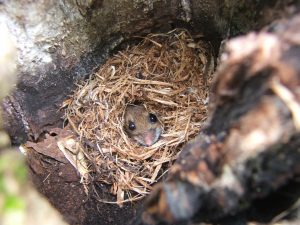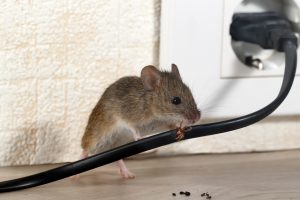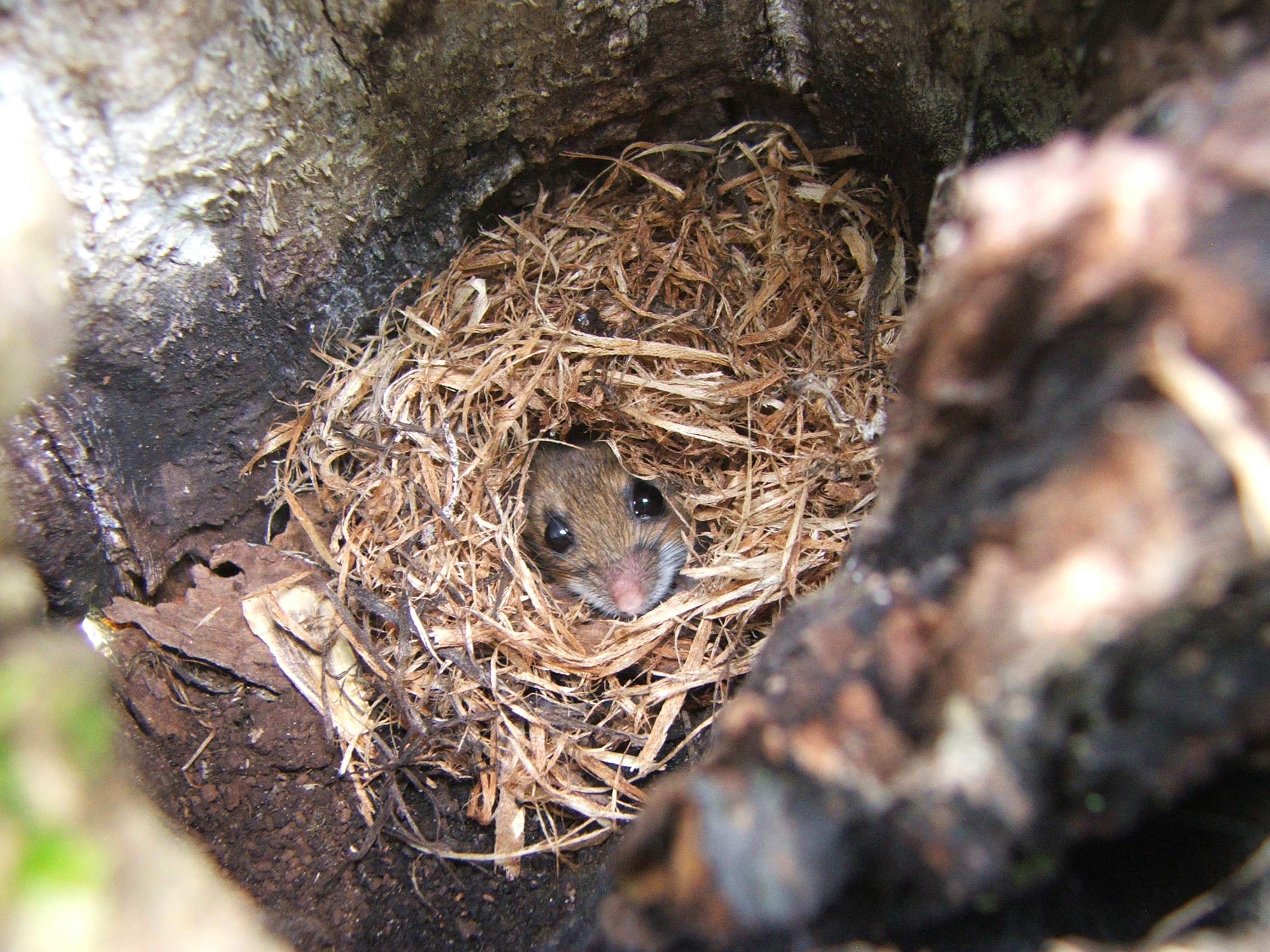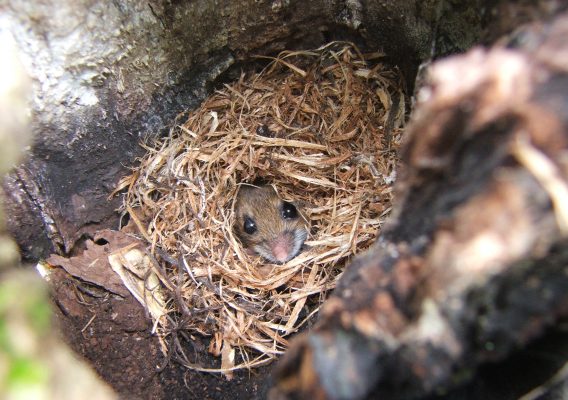Table of Contents
Why Rodents Target Pool Equipment
As temperatures drop, mice, chipmunks, and squirrels start looking for warm, dry spaces to nest. Unfortunately, pool equipment offers exactly what they need — warmth from heaters, shelter from pump housings, and soft insulation for nesting material. Once inside, these pests can cause severe damage to wiring, filters, and stored pool covers.
In Connecticut, we see the most rodent-related damage between late fall and early spring. Pool heaters and stored covers are frequent targets, and it’s not uncommon to discover chewed wiring or shredded covers when reopening in the spring. Even a single nest can damage expensive pool components or cause costly electrical repairs.
Proactively inspecting and securing your pool equipment before winter helps prevent these problems. By combining exclusion, deterrents, and proper storage, you can keep rodents from turning your pool area into a winter home.
How to Tell If Rodents Have Been in Your Pool Equipment

Catching rodent activity early can save you a lot of hassle and money down the road. Here are some telltale signs to keep an eye out for:
- Nesting debris: Bits of shredded insulation or odd nesting material tucked inside your pool heater or around the pump—rodents love cozy spots.
- Chew marks: Notice any gnawed wires, tubing, or fittings? That’s a clear sign that critters have been at work.
- Droppings or strange smells: Droppings or an unpleasant odor near stored covers or equipment housings may indicate that animals have been hanging around.
- Sudden equipment issues: If your heater or pump starts acting up or fails repeatedly for no apparent reason, rodents chewing through wires could be the culprit.
- Small holes or gaps: Look for tiny entry points or fresh chew holes around electrical conduits and openings, mice can squeeze through gaps as small as a pencil.
If you spot any of these warning signs, perform a thorough inspection of all equipment and consider calling a professional. Even a single rodent nest can lead to thousands of dollars in electrical or equipment repairs if left unchecked.
Rodent-Proofing with Physical Barriers
Stopping rodents before they move in for the winter is your best bet. Start by walking around your pool equipment and storage areas, and look for any small gaps, cracks, or holes. Remember, mice can squeeze through spaces as tiny as a pencil!
- Seal up gaps with steel wool or metal mesh: Rodents hate steel wool and can’t chew through it, and hardware cloth (a fine metal mesh) works great too.
- Cover vents and air intakes: Use quarter-inch hardware cloth over any openings. Experts recommend metal mesh for keeping small critters out.
- Screen cabinet bottoms: If you have pump rooms or control boxes with open bases, add mesh or solid panels that extend to the floor.
- Clear out clutter and nesting stuff: Keep leaves, old pool liners, wood piles, and anything else that could be used for nesting away from your equipment.
- Store equipment off the ground: Keeping things raised off the ground makes it tougher for rodents to burrow underneath.
Tackling these steps makes it way harder for rodents to sneak into your pool area and mess with your equipment. Tackling these steps makes it much harder for rodents to sneak into your pool area and damage your equipment.
Learn more about How to Keep Rodents Out of Pool Equipment During the Winter. It covers more ways to protect your pumps, filters, and heaters when temperatures drop, before nesting pests have a chance to move in.
Rodent Repellents: Extra Protection Alongside Barriers
Once you’ve sealed entryways and blocked obvious spots, repellents add an extra layer of protection. They’re handy for those awkward gaps you just can’t close completely. Repellents aren’t a cure-all, but they do make your pool area a lot less inviting to curious critters.
- Essential oils: Scents like peppermint, eucalyptus, cinnamon, and clove can help keep rodents away. Soak cotton balls or cloth scraps in these oils, then scatter them near trouble spots.
- Botanical repellent pouches: Products that rely on natural scents to push mice out, no harsh chemicals required.
- Mix it up: Rodents are quick to adapt, so it’s smart to rotate different oils or repellent brands. Change things up now and then to keep deterrents working.
- Be strategic: Always avoid blocking vents or airflow around your equipment with strong-smelling materials. Ventilation matters!
Think of repellents as a sidekick; they’re most effective when teamed up with physical barriers and exclusion tactics. When you layer your defenses, you’ll make your pool area a tough spot for any rodent looking for a new home.
Small rodents, especially mice, are fond of small equipment like pool heaters to build nests for the winter. Refer to our guide: Can You Mouse-Proof Pool Heaters? This resource discusses why pool heaters may attract rodents and outlines steps such as sealing entry points, trimming surrounding vegetation, and using scent repellents to help protect equipment during the winter.
Seasonal & Operational Practices for Rodent Winter Protection
Staying ahead with regular maintenance makes rodent prevention much easier and far more effective. Here are some practical habits to roll into your seasonal routine:
- Pre-winter checkup: Before colder weather hits, take a walk around your pool equipment and covers. Double-check seals, mesh screens, and any barriers. Catching minor issues now is much easier than dealing with a full-blown rodent problem later.
- Winter maintenance: After closing things up for the season, set a reminder to inspect your equipment and pool cover each month. Watch for fresh chew marks, loose covers, or signs of nesting. Spotting trouble early means less hassle down the line.
- Keep air flowing: Make sure vents and intake panels aren’t blocked by repellents or barriers. Rodents often follow airflow, so good ventilation helps prevent hidden spots where they might settle in.
- Stay tidy: Don’t let leaves, mulch, or debris pile up around your equipment. These piles make perfect hideouts and nesting spots for rodents, so keeping the area clean is key.
- Seal smart, not forever: While it’s important to seal gaps with mesh or sealant, leave access points open for technicians or future inspections. That way, you keep pests out while still allowing service visits.
Working these habits into your routine helps keep your rodent barriers strong and your pool area protected, season after season. Learn more: Tips to Protect Your Swimming Pool During Harsh Winters – The Swimming Pool Store.
Pool Closing Tips from the Professionals
Rodents don’t take a day off, and by the time spring arrives, they may already have caused unseen harm. The strategies in this guide, sealing entry points, installing mesh barriers, using scent deterrents, and maintaining vigilance throughout the winter, provide a comprehensive defense against damage to your pool equipment, wiring, and covers. If you catch trouble early, you can often repair damage before it becomes a significant expense.
For added peace of mind, pair these rodent-proofing steps with proper winter pool closing techniques. Learn how to shut down your pool safely, preserve water quality, and prevent damage with our Free Guide, How to Close Pools for Winter: Complete Guide, Tips, and Step-by-Step Instructions. Act early to keep your pool and equipment in top shape for warm weather.
At The Swimming Pool Store, our goal is to help you maintain a safe, reliable, and long-lasting pool season after season. With more than 55 years of experience, our team provides trusted pool services, including maintenance, repairs, and seasonal care, to protect your investment. Contact us today to learn how we can keep your pool equipment and water systems in top condition year-round.


